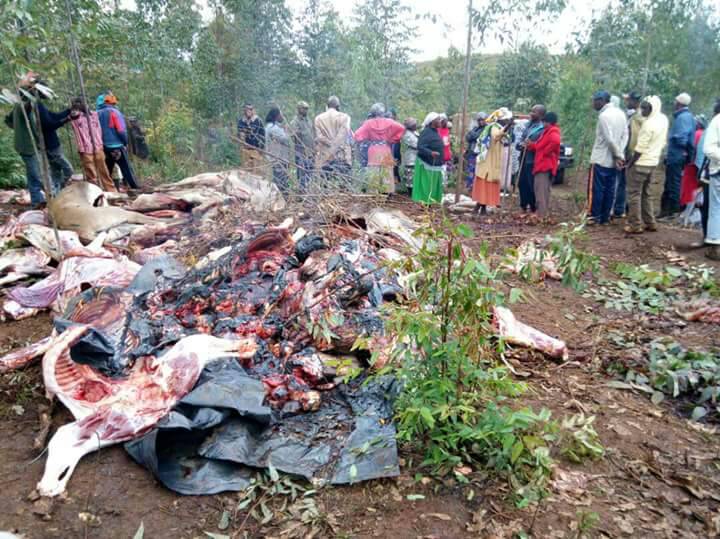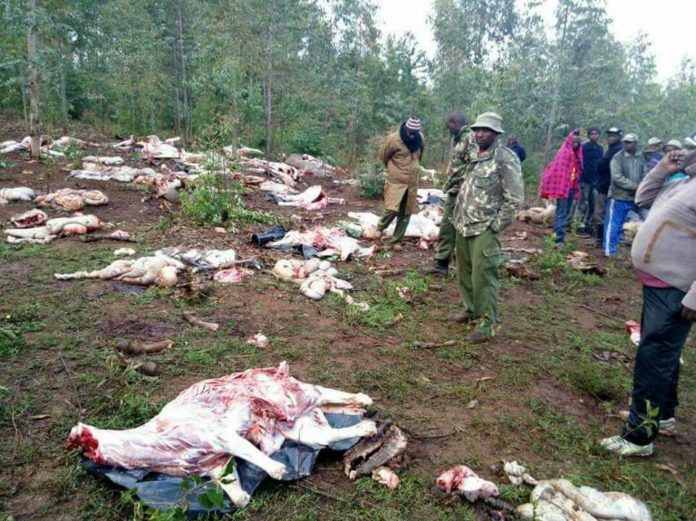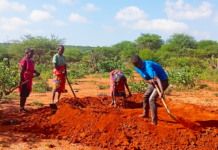By Winnie Kamau and Bernard Warutere
Recently two brothers from Makutano village in Rwacumari Ndeiya were arrested with 35 slaughtered hideless donkeys in a forest in Limuru.
This raised eyebrows on why and where the skins were headed to.
This is one among many torturous stories of donkeys in Kenya and many parts of Africa.
The local Administration Police in Ndeiya accosted more than 30 young men slaughtering the donkeys but all managed to escape leaving behind a van inside the forest where they were using it to store and trade the hides.
Later the owner of the van believed to be the entrepreneur came for the car and was arrested together with his brother. The residents say this business has been going on for months in the forest where they always find a lot of decomposing bones, skulls of donkeys and a pungent smell. The biggest concern is the loss of their donkeys.

According to the owner they buy the donkeys from neighboring county transport them with fake livestock permits destined to the slaughtering forest.
This according to According to the approximation given by FAO reports estimates the number of donkeys in the world at 44 million with the highest population in China at 13 million donkeys.
The Donkey Sanctuary an international organization that deals with the welfare of animals have raised the red flag against the mistreatment of donkeys and the sharp decline of the number donkeys from the various areas they work in Kenya.
Savanna Myszka the Publicity officer at Donkey Sanctuary noted with a lot of concern “The number of donkeys are reducing quickly in many areas where we work, in places like Mlolongo in Kenya, some of the owners we work with used to own 25-30 donkeys but now they only own 2-3 due to rampant thefts for informal slaughter at night.”
She adds “As the skin trade strips donkey numbers down, the remaining donkeys are working harder to take up the slack so welfare of the surviving donkeys is affected.”
Statistics from an ebook on Re Membering Kenya Vol 2 indicate the current population of donkeys in Kenya stands at about 1.6 million with the highest number in Rift Valley region with over 800,000 donkeys followed by the Northern region with almost 500,000 and the Coast with the least at 30,000 donkeys.
Brooke an equine welfare charity based in the United Kingdom in one of their reports estimated the number of donkeys in Mandera County at over 60,000 with most of the pastoralists relying on the donkeys for transport of goods and fetching water. This has led to a sharp increase of their prices as many pastoralists continue discovering the importance and the role the donkeys play in their day to day activities which has led to many of the donkeys suffering from overwork and lack of care.
The Donkey Sanctuary have been working with communities in Kenya to encourage owners to secure their donkeys at night but in peri-urban areas, there is little space to do this, and zero-grazing brings new welfare challenges in marginal communities.
They are urging the government of Kenya to help spread the awareness of the mistreatment of skinning the donkeys. Savanna notes “In Tanzania, we have funded a number of community education projects which have used community and local radio as well as TV in some cases.” adding “We’ve also worked in around 20 Maasai communities to build secure fenced areas to hold donkeys in at night. This has resulted in a total drop in the numbers of thefts to zero. Again, governments can support communities with this, as well as with help with the nutrition switch from grazing to zero-grazing.”
A huge demand has been created through China’s growing demand to produce a medicinal gelatin (ejiao). This is according to the Donkey Sanctuary’s report ejiao is a hard gel which can be dissolved in hot water or alcohol to be used in food or drink or it is used in beauty products such as face creams.
Ejiao is believed to improve blood circulation so is used as a blood tonic by people with anaemia, low blood cell counts or reproductive problems.
From our research, we found that one donkey hide can fetch as much as 15 USD to 50 USD from an online shop Ali Baba. This cruelty on the donkeys needs to be stopped with urgency from government and all stakeholders.














